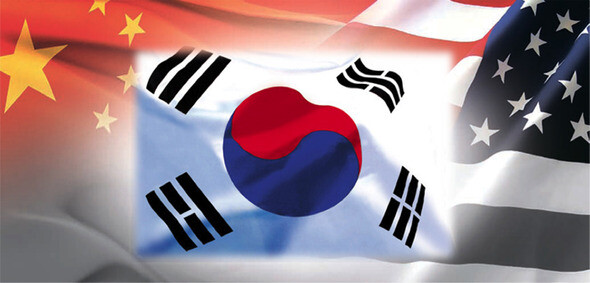hankyoreh
Links to other country sites 다른 나라 사이트 링크
More than half of South Koreans pick US as most essential for development

An intense tug of war is underway between the US and China over the foreign policy and security issues that dominate political affairs on the Korean Peninsula, including the North Korean nuclear issue and the THAAD missile defense system. While it’s unclear what results the leaders of the US and China may achieve during their summit on Apr. 6 and 7, five out of 10 South Koreans are seeking the answer from close cooperation with the US for South Korea’s development. This was apparently influenced by ongoing concerns about security and hostility over China’s retaliatory measures against the THAAD deployment.
In a poll of 1,512 adults (19 years old and above) nationwide that was carried out from Mar. 30 to Apr. 1 by the polling organization MRCK, commissioned by the Hankyoreh and the Hankyoreh Economy and Society Research Institute (HERI), 51.5% of respondents chose the US over China and Japan when asked which country’s cooperation was essential for South Korea’s development. 36.2% of respondents selected China, and just 3.3% of respondents said that more cooperation with Japan was necessary. This represents a stark contrast with the results of a poll in Dec. 2014 in which 58.5% of respondents regarded China as the most important partner for cooperation, compared with 34.5% who felt that way about the US.
“A larger number of respondents selected the US, defying expectations that more respondents would call for stronger cooperation with China, because of economic losses resulting from the recent retaliatory measures against THAAD. This appears to reflect the uncertainty felt by South Koreans who are watching political developments not only in South Korea but also in the US,” said Han Gwi-yeong, head of HERI’s Social Investigation Center and the person in charge of this poll, on Apr. 7.
“The US has profited indirectly because of South Koreans’ resentment of China’s retaliation against THAAD,” concluded Woo Jeong-yeop, a visiting research fellow at the Sejong Institute. Indeed, the respondents who chose the US explained their choice by saying that the US is an ally (21%) and because it helps with security (11.1%). An overwhelming number of those who selected China offered economic reasons, including South Korea’s dependence on trade with China.
By generation, people in their sixties and older (66.1%) and in their twenties (56.7%) chose the US as the most important partner for cooperation. In contrast, 50.7% of people in their forties said they valued China, which was much higher than those who chose the US (39.1%). There was no clear preference among respondents in their thirties and fifties, with China and the US both being selected by 40% of respondents in these two groups.
“Over the past few years, men in their 20s have been showing conservative tendencies on the issue of security,” said Kim Ji-yun, an analyst at the Asan Institute for Policy Studies.
Responses also differed according to political orientation. Among those who identified themselves as supporters of progressive Minjoo Party presidential candidate Moon Jae-in, 48.1% valued cooperation with China, and 39.1% chose the US. 79.3% of those who support conservative Liberty Korea Party candidate Hong Joon-pyo and 60.8% of those who support conservative Bareun Party candidate Yoo Seong-min wanted to increase cooperation with the US. Among supporters of moderate People’s Party candidate Ahn Cheol-soo, 57.8% selected the US and 29.9% chose China.
“If a balance was struck [between the influence of the US and China], it wouldn’t be easy to choose between them. These results show that public opinion in South Korea has been clearly divided into separate camps,” said Kim Jun-hyeong, a professor at Handong Global University.
By Kim Ji-eun, staff reporter
Please direct questions or comments to [english@hani.co.kr]

Editorial・opinion
![[Column] Season 2 of special prosecutor probe may be coming to Korea soon [Column] Season 2 of special prosecutor probe may be coming to Korea soon](https://flexible.img.hani.co.kr/flexible/normal/500/300/imgdb/original/2024/0426/3317141030699447.jpg) [Column] Season 2 of special prosecutor probe may be coming to Korea soon
[Column] Season 2 of special prosecutor probe may be coming to Korea soon![[Column] Park Geun-hye déjà vu in Yoon Suk-yeol [Column] Park Geun-hye déjà vu in Yoon Suk-yeol](https://flexible.img.hani.co.kr/flexible/normal/500/300/imgdb/original/2024/0424/651713945113788.jpg) [Column] Park Geun-hye déjà vu in Yoon Suk-yeol
[Column] Park Geun-hye déjà vu in Yoon Suk-yeol- [Editorial] New weight of N. Korea’s nuclear threats makes dialogue all the more urgent
- [Guest essay] The real reason Korea’s new right wants to dub Rhee a founding father
- [Column] ‘Choson’: Is it time we start referring to N. Korea in its own terms?
- [Editorial] Japan’s rewriting of history with Korea has gone too far
- [Column] The president’s questionable capacity for dialogue
- [Column] Are chaebol firms just pizza pies for families to divvy up as they please?
- [Column] Has Korea, too, crossed the Rubicon on China?
- [Correspondent’s column] In Japan’s alliance with US, echoes of its past alliances with UK
Most viewed articles
- 1‘We must say no’: Seoul defense chief on Korean, USFK involvement in hypothetical Taiwan crisis
- 2N. Korean delegation’s trip to Iran shows how Pyongyang is leveraging ties with Moscow
- 3[Column] Season 2 of special prosecutor probe may be coming to Korea soon
- 4‘Weddingflation’ breaks the bank for Korean couples-to-be
- 5[Column] Has Korea, too, crossed the Rubicon on China?
- 6[Editorial] New weight of N. Korea’s nuclear threats makes dialogue all the more urgent
- 7[Reportage] On US campuses, student risk arrest as they call for divestment from Israel
- 8Korea sees more deaths than births for 52nd consecutive month in February
- 9[Column] Park Geun-hye déjà vu in Yoon Suk-yeol
- 10[Guest essay] The real reason Korea’s new right wants to dub Rhee a founding father